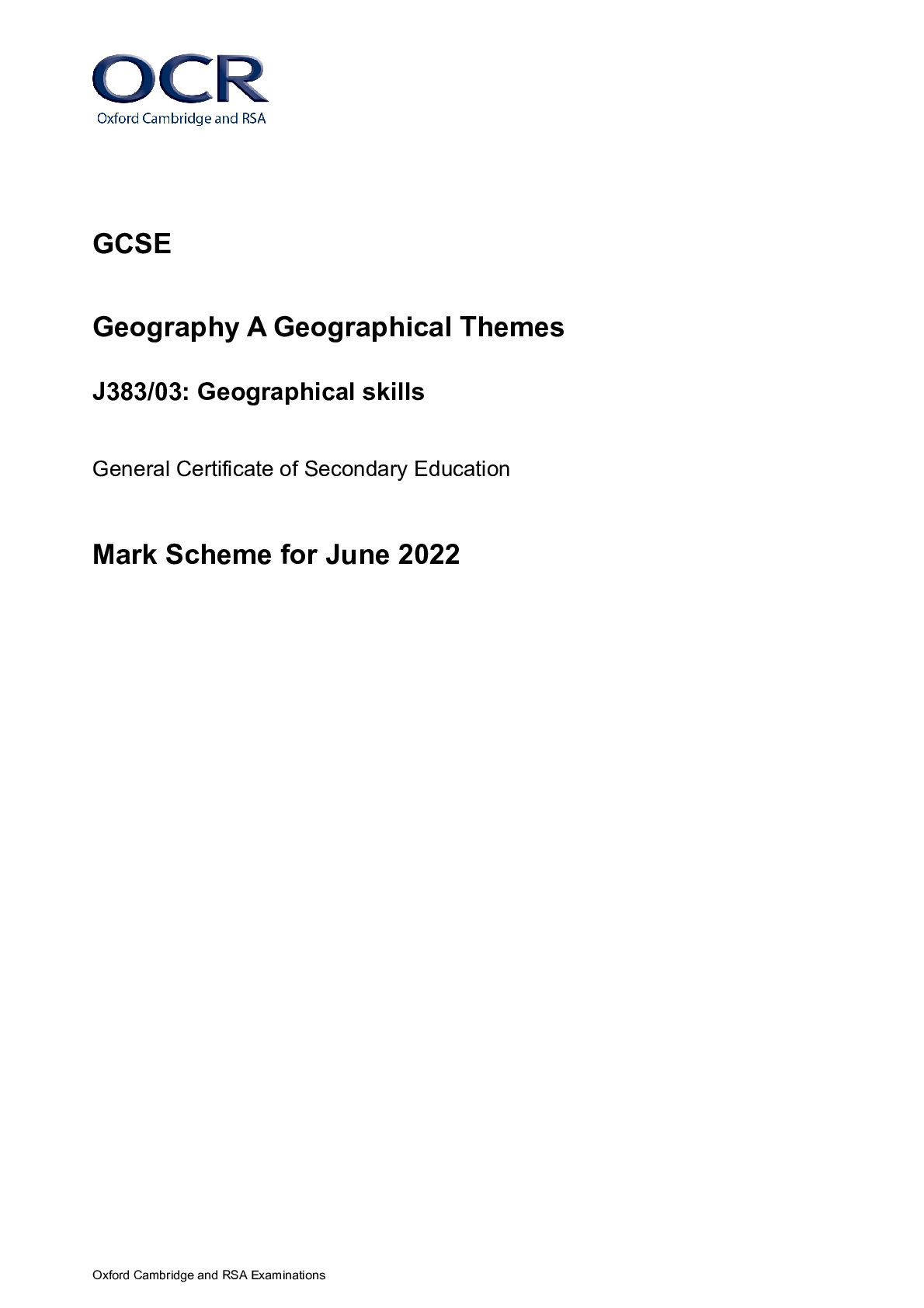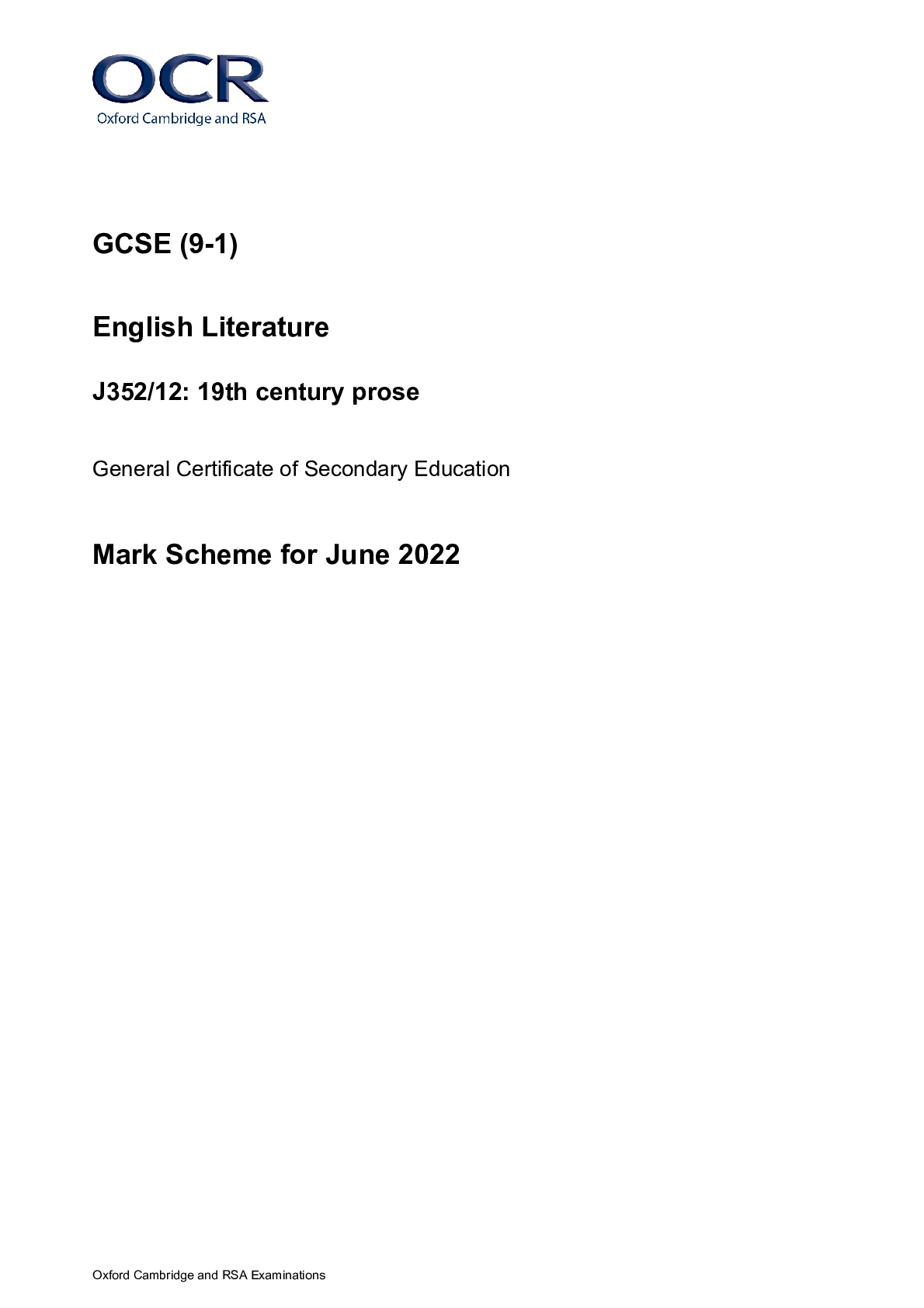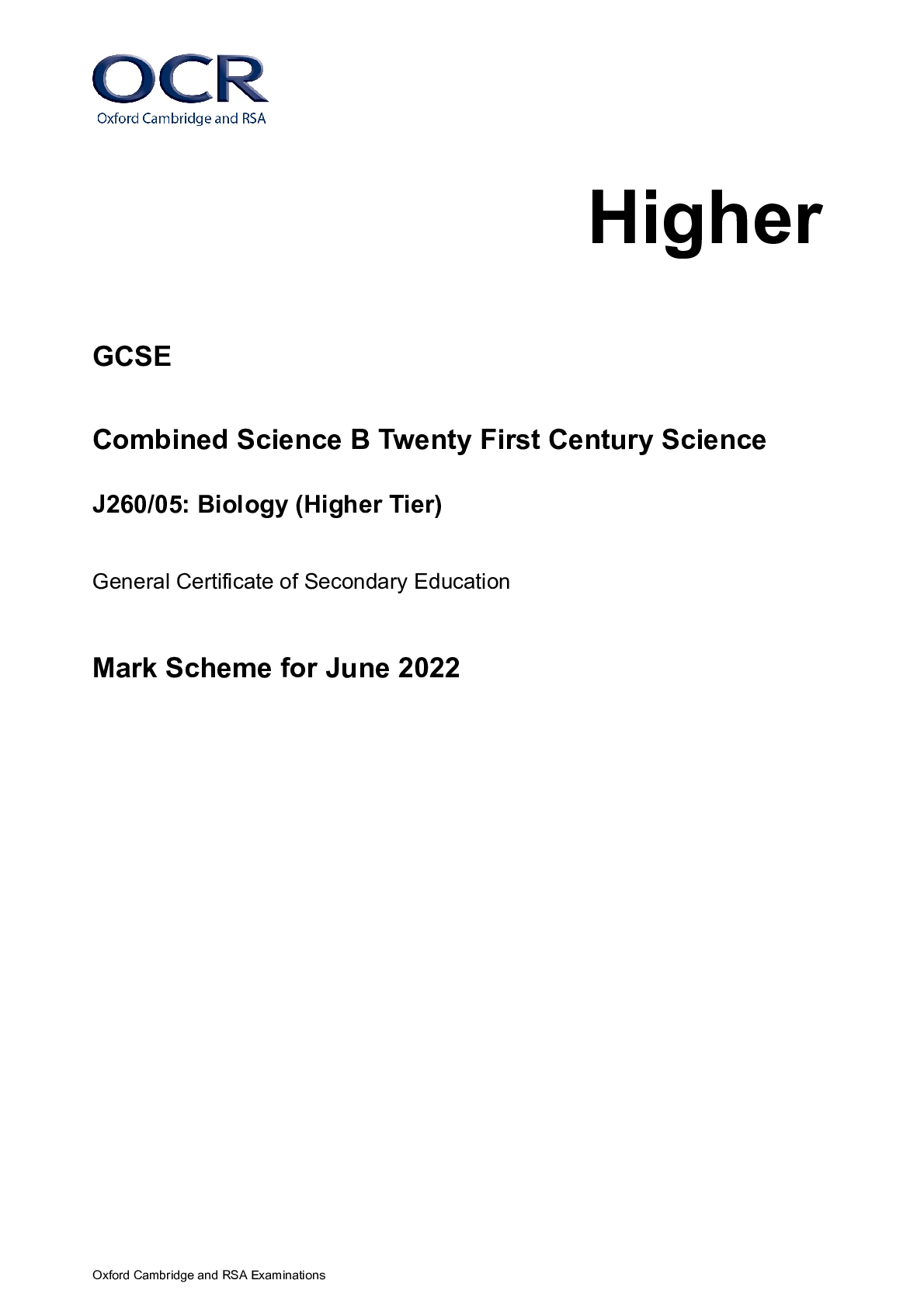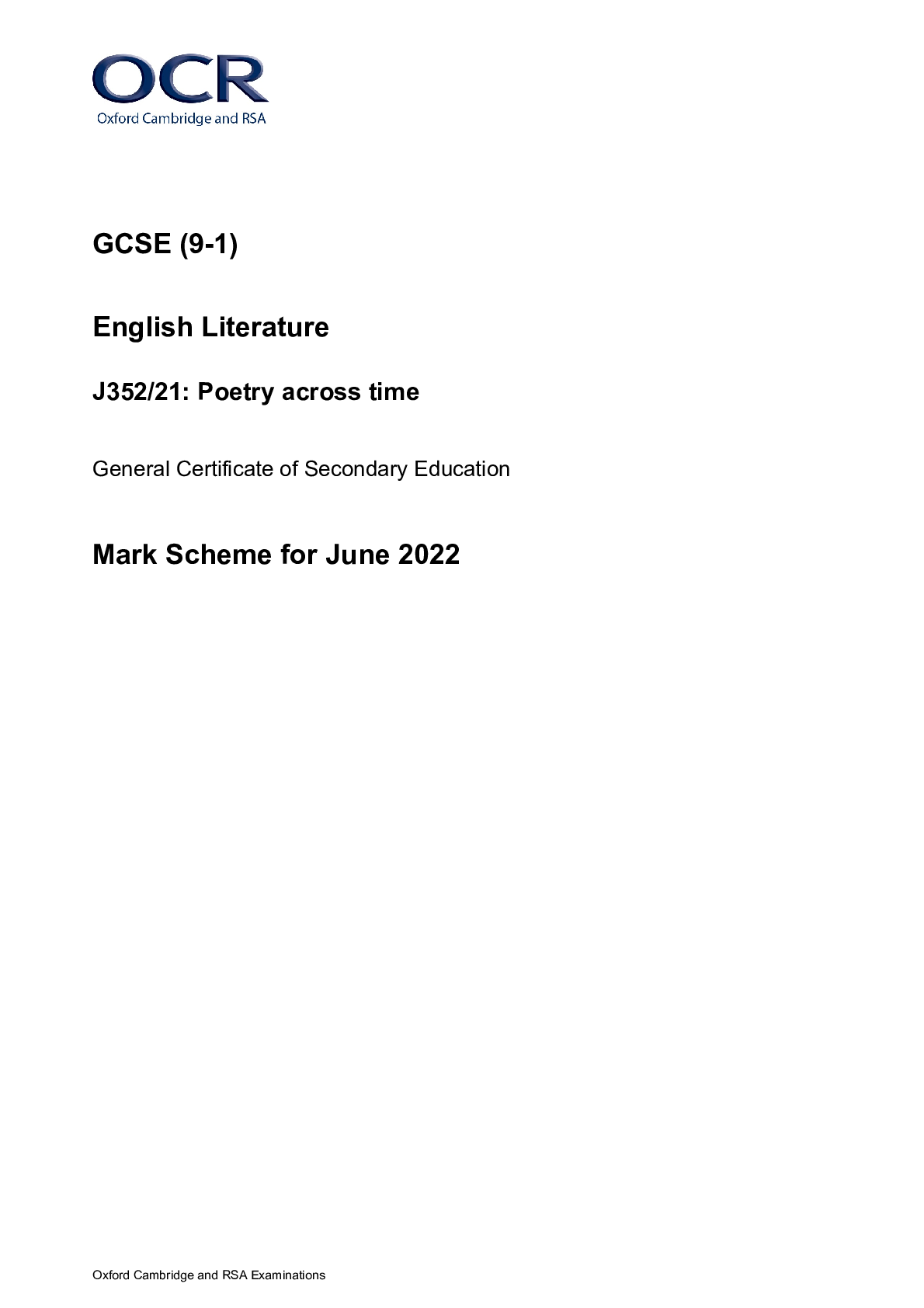History > GCSE MARK SCHEME > GCSE (9–1) Latin J282/01: Language General Certificate of Secondary Education Mark Scheme for Nove (All)
GCSE (9–1) Latin J282/01: Language General Certificate of Secondary Education Mark Scheme for November 2020
Document Content and Description Below
GCSE (9–1) Latin J282/01: Language General Certificate of Secondary Education Mark Scheme for November 2020 Oxford Cambridge and RSA Examinations GCSE (9–1) Latin J282/01: Language Gene... ral Certificate of Secondary Education Mark Scheme for November 2020Oxford Cambridge and RSA Examinations OCR (Oxford Cambridge and RSA) is a leading UK awarding body, providing a wide range of qualifications to meet the needs of candidates of all ages and abilities. OCR qualifications include AS/A Levels, Diplomas, GCSEs, Cambridge Nationals, Cambridge Technicals, Functional Skills, Key Skills, Entry Level qualifications, NVQs and vocational qualifications in areas such as IT, business, languages, teaching/training, administration and secretarial skills. It is also responsible for developing new specifications to meet national requirements and the needs of students and teachers. OCR is a not-for-profit organisation; any surplus made is invested back into the establishment to help towards the development of qualifications and support, which keep pace with the changing needs of today’s society. This mark scheme is published as an aid to teachers and students, to indicate the requirements of the examination. It shows the basis on which marks were awarded by examiners. It does not indicate the details of the discussions which took place at an examiners’ meeting before marking commenced. All examiners are instructed that alternative correct answers and unexpected approaches in candidates’ scripts must be given marks that fairly reflect the relevant knowledge and skills demonstrated. Mark schemes should be read in conjunction with the published question papers and the report on the examination. © OCR 2020J282/01 Mark Scheme November 2020 2 Annotations Annotation Meaning Benefit of doubt Incorrect point – comprehension questions only Harmful addition: additional information or alternative incorrect version More serious error in translation Inconsequential error in translation Repeated or consequential error Correct point – comprehension questions only (except for isolated knowledge of vocabulary in Qu 20) Omission mark Highlight or SEEN Work seen and considered which does not harm the response BP Blank page (only to be used when there is no writing on the page – see p12) 0 Translation question 1 Translation question 2 Translation question 3 Translation question 4 Translation question 5 Translation question NB: Please use the on-screen mark confirmation tool (found in Tools → Options).J282/01 Mark Scheme November 2020 3 Subject Specific Marking Instructions Ignore misspelling of proper nouns in comprehension questions (including failure to reproduce correctly in the nominative case).J282/01 Mark Scheme November 2020 4 Question Answer Mark Guidance 1 He was a young man (1). He had a very good voice (1). 2 iuvenis Accept ‘youth’. optimam Accept ‘excellent’/’the best’/’the greatest’. Insist on the superlative. habebat Accept ‘He was having’. 2 He made a journey to the island of Sicily (1). 1 Accept ‘He went’/’He took a journey’/’He went on a journey’/’He travelled’. Do not accept ‘She (HA) went to Sicily’. ad Accept ‘towards’. Do not accept ‘into’. 3 He received (1) many prizes (1). 2 accepit Accept ‘He accepted’/‘He won’/’He was awarded’. praemia Accept ‘rewards’. multa Accept ‘very many’. Do not accept ‘most’/’more’. 4 He asked some sailors (1) to prepare a ship (1). 2 nonnullos Accept ‘several’; do not award the mark if omitted. pararent Accept ‘to get…ready’. navem Accept ‘boat’.J282/01 Mark Scheme November 2020 5 Insist on the singular. 5 Steal all the prizes (1) Kill Arion (1) 2 auferre Accept ‘carry off’, ‘take away’. Do not accept ‘take’. omnia Insist on ‘all’. necare Accept ‘to murder’. 6 (a) That he was in danger (1) 1 Ignore magno. 6 (b) He seized his lute (1) and began to sing (1). 2 rapta Accept ‘He grabbed’/’He snatched’/’He took up’. Accept ‘Seizing’ etc. Do not accept ‘He took’. cithara Accept ‘cithara’. Award 1/2 for the wrong order: ‘He began to sing and seized his lute’. 7 He was afraid (1) that he might be killed (1). 2 timens Accept ‘He feared’/’He was scared’/’He was fearful’/’He was fearing’. Accept ‘Fearing’/’Afraid’/’For fear’. necaretur Accept ‘the sailors might kill him’. Do not accept ‘he might die’. 8 (a) He was overcome by such great joy (1). 1 Accept ‘It made him very happy’ vel sim. tantoJ282/01 Mark Scheme November 2020 6 Accept other correct translations (e.g. ‘a lot of’/‘much’/’such’). Do not accept ‘the most’. Insist on a correct reference to tanto.’ gaudio Accept ‘pleasure’, ‘happiness’. superatus est Accept ‘he was overpowered’/’he was overwhelmed’. Accept also ‘He wanted to give help to the young man’. 8 (b) He carried Arion to land (1). 1 terram Do not accept ‘ground’, ‘country’. portavit Accept ‘brought’. 9 Vocalist (1) – someone who sings (1) Audible (1) – able to be heard (1) 4 One mark for the derivative and one for its meaning. Accept other valid derivatives. Accept incorrect but recognisable spelling. Incorrect derivation cannot score a mark for a correct meaning of the English word; correct derivation can score a mark even if the meaning expressed is incorrect. If a second, incorrect, meaning is given, no mark can be awarded. Question Answer Mark Guidance 10 (a) Imperfect (1) 1 Do not accept ‘Past’. Additional incorrect detail is HA (e.g. ‘imperfect subjunctive’).J282/01 Mark Scheme November 2020 7 10 (b) Accusative (1); follows the preposition ad (1) 2 For the first mark: Do not accept ‘accusative plural’. For the second mark: Accept: ‘It follows a preposition’. ‘He went to the island of Sicily’. Do not accept: ‘It agrees with Siciliam ’. Another use of accusative (e.g. accusative and infinitive) 10 (c) sibi 1 Insist on correct spelling. 10 (d) volo 1 Insist on correct spelling. Accept narrare. Accept redire. Accept constituit (= possible historic present) 10 (e) Dative 1 Do not accept dative singular. 10 (f) Infinitive (1); follows constituit (1) 2 For the first mark: Additional incorrect detail is HA (e.g. ‘perfect active infinitive’. For the second mark there must be a link to constituit: Accept: ‘He decided to return’. ‘He decided to do an action’. Do not accept: ‘It is the second/secondary verb’. ‘It follows another verb’. An incorrect translation of constituit. 10 (g) nonnullos, nautas or navem 1 Insist on correct spelling.J282/01 Mark Scheme November 2020 8 10 (h) Indirect command (with ut) 1 Do not accept reference to ut alone. 11 (a) pueri (1) in silvas (1) festinaverunt (1). 3 Word order is flexible. Accept any translation using correct Latin even if vocabulary is outside of Restricted Vocabulary. ‘into the woods’ Accept in silvam. 11 (b) amicos (1) invenire (1) possumus (1). 3 Word order is flexible. Accept any translation using correct Latin even if vocabulary is outside of Restricted Vocabulary List (e.g. amicas). 11 (c) cur (1) muros (1) aedificabatis (1), servi (1)? 4 Word order is flexible. Accept any translation using correct Latin even if vocabulary is outside of Restricted Vocabulary. Question Answer Mark Guidance 12 They wanted (1) to rule Sicily (1). 2 regere. Accept ‘to control’/’to rule over’.J282/01 Mark Scheme November 2020 9 Ignore insulam. 13 (a) They had been victorious (1) in very many battles (1). 2 Accept ‘They had won very many battles’. vicerant Accept ‘They had been winning’/’They had conquered’. Accept the perfect tense. plurimis Accept ‘most’. Insist on the superlative. Do not accept ‘more’. 13 (b) They might be overpowered (1) by the Carthaginians (1). Or The Carthaginians might/may/would/could (1) overpower them (1). 2 superarentur Accept ‘They might be overcome’/’They might be overwhelmed’/’They might be beaten/’They might be conquered’. 14 • They had built swift ships (1). • They were the most famous sailors of all (1). 2 celeres Accept ‘quick’/’fast’. Do not accept ‘quickly’. aedificaverant Accept the perfect tense. omnium Insist on ‘of all’. 15 To bring back (1) victory to Rome (1) 2 Accept ‘So that they might return to Rome victorious’. Accept ‘To be able to go back to Rome in victory’. referrent Accept ‘to take back’.J282/01 Mark Scheme November 2020 10 Do not accept ‘to bring’/’to take’. Romae Do not accept ‘for Rome’. 16 (a) They seemed (1) to have an easy victory (1). 2 videbantur Do not accept ‘They were being seen’. victoriam facilem habere Accept ‘to be winning easily’/’to be having an easy victory’/’to have victory easily’. Do not accept ‘to have conquered easily’. victoriam Insist on the singular. 16 (b) Many Carthaginians (1) joined themselves to the Romans (1). 2 ‘Many Romans joined themselves to the Carthaginians’ = 1/2 Romanis se iunxerunt Accept ‘joined the Romans’. iunxerunt Accept the pluperfect tense. Do not accept the imperfect tense. 17 (a) When he found out (1) what had happened (1) 2 cognovit Accept the pluperfect tense. Accept ‘he got to know’/’he discovered’/’he learnt’. Do not accept ‘he realised’/’he knew’/’he understood’. accidisset Accept ‘what had been happening’/’what happened’/’that this had happened’. Do not accept ‘what was happening’.J282/01 Mark Scheme November 2020 11 17 (b) They brought help to (1) the rest of the Carthaginians (1). 2 Accept ‘They helped the rest of the Carthaginians’. auxilium tulerunt Accept ‘They gave help’. ceteris Accept ‘the other’. 18 The whole fleet (1) was destroyed by a storm (1). 2 Accept ‘A storm destroyed the whole fleet’. tota classis Accept ‘the entire fleet’/’all of the fleet’. tempestate Accept ‘by a tempest’. deleta est Accept pluperfect tense. Guidance on applying the marking grids for GCSE Latin The classification below should be seen only as a general guide, the intention of which is to maintain standards year on year. Lead Markers should consider each instance on its own merits in the context of the passage and the section. The mark scheme awards marks for the proportion of sense communicated. If a candidate has communicated the ‘gist’ of a sentence (e.g. they know who has done what to whom) they will score 5, 4 or 3 marks. If they have not understood the basic sense of the sentence, they will score a maximum of 2. A completely correct translation with no omissions or errors will always score 5. The key judgment for a candidate who has demonstrated understanding of the overall meaning of the sentence is whether they should score 5, 4 or 3. This will depend on the gravity of theirJ282/01 Mark Scheme November 2020 12 errors/omissions and may depend on the number of words in the sentence to be translated or the difficulty of the Latin and is usually decided at standardisation after a judgment has been formed about the performance of candidates. A word containing more than one error should be treated as a maximum of one serious error. Repeated and consequential vocabulary errors should not be penalised. e.g. tum, gaudentes quod Scipio libenter se acceperat, ad naves suas reverterunt. ‘then, rejoicing because Scipio had received them willingly, they turned back to their ships’ (i) ‘rejoicing because Scipio had received them willingly, they turned back to their ships’ - the omission of tum is an inconsequential error, so 5 marks out of 5. (ii) ‘then, rejoicing because Scipio had received them willingly, they turned back to their ship’ - the number error on ‘ship’ (it’s plural in the Latin) is an inconsequential error, so 5 marks. (iii) ‘then, rejoicing because Scipio was receiving them willingly, they turned back to their ship’ - despite the tense error on acceperat and the number of naves, the candidate has clearly got the point, so a mark of 4 is appropriate. (iv) ‘then, unhappy because Scipio had received them, they turned back to their ships’ - the mistranslation of gaudentes is a more serious error here, as it gets the wrong point (they were happy, not unhappy!) and the omission of libenter could be considered a serious omission. The overall sense is more or less correct (Scipio had received them and they went back to their ships) so a mark of 3 would be appropriate. (v) ‘Scipio was unhappy because they had not welcomed him and they turned back to their ship’ - there are a number of errors here (no tum, Scipio taken as agreeing with gaudentes, wrong meaning of gaudentes, omission of libenter, number of naves) but the key judgment point is that the general meaning has not been communicated, so a maximum of 2 would be appropriate. It has enough correct sense to score more than 1. The sort of errors that we would generally expect to be considered ‘inconsequential’ would be: • number errors (singular/plural - naves taken as singular above) • minor tense errors (e.g. one past tense taken as another - acceperat taken as imperfect above) • minor conjunctions/adverbs incorrectly translated or omitted (tum above) • failure to reproduce proper nouns in the nominative caseJ282/01 Mark Scheme November 2020 13 • incorrect third person subject pronouns (e.g. ‘he’ instead of ‘she’) • adjectives or adverbs incorrectly translated as superlative • omission of pronoun agent in active to passive transposition • a minor vocabulary error which does not prevent communication of the meaning of the Latin (e.g. eodem tempore = ‘at that time’) The sort of errors that we would generally expect to be considered ‘more serious’ would be: • major vocabulary errors which give the wrong sense (e.g. gaudentes taken as ‘unhappy’ above). • errors of case • the omission of a word which affects the meaning of a section • errors of tense (apart from minor tense errors – see above), e.g. a future tense taken as a past tense • incorrect constructions – for example: missing a purpose clause (e.g. ad forum ivit ut cibum emeret = ‘he went to the form and bought food’) missing a gerundive (e.g. ad forum ivit ad cibum emendum = ‘buying food he went to the forum’) incorrect handling of ablative absolute • errors of voice (e.g. milites necati sunt = ‘The soldiers killed’) • errors of person (except ‘he’/’she’) The categorisation of ‘inconsequential’ and ‘more serious’ errors might vary within a paper, depending on the length of the sentence for translation (e.g. the omission of a word in a five word sentence might be judged more serious than a similar omission in a twelve word sentence) and might vary between papers. The final decisions on what constitute ‘inconsequential’ and ‘more serious’ errors will be made and communicated to assessors via the standardisation process (after full consideration of candidates’ responses) and these decisions will be captured in the final mark scheme for examiners and centres. 5 Perfectly accurate with no errors or omissions, or one inconsequential error 4 Essentially correct but two inconsequential errors or one more serious 3 Overall meaning clear, but more serious errors or omissions 2 Part correct; but with overall sense lacking/unclear 1 No continuous sense; isolated knowledge of vocabulary onlyJ282/01 Mark Scheme November 2020 14 0 No response worthy of credit Question Answer Mark Guidance Content Examples of inconsequential and more serious errors 19 (i) proximo anno senatores Pulchrum in Siciliam miserunt. (In) the next year the senators sent Pulcher into Sicily. 5 proximo anno: accept ‘(In) the following year. in Siciliam: accept ‘to Sicily’. Inconsequential proximo = ‘nearest’ senatores = ‘the senate’/’the senatores’ in = ‘in’ More serious proximo anno = ‘around a year later’/’every year’J282/01 Mark Scheme November 2020 15 Question Answer Mark Guidance Content Examples of inconsequential and more serious errors (ii) statim Pulcher portum Drepani oppugnare constituit. At once Pulcher decided to attack the port of Drepanum. statim: accept ‘immediately. portum: accept ‘harbour’. Drepani: accept ‘in/at Drepanum’. Inconsequential Misplacement of statim More serious Omission of statim portum = ‘gate’ or ‘door’ portum Drepani: Drepanum harbour oppugnare = ‘to fight’ constituit = ‘planned’ (REP from 10f) (iii) ibi enim omnes naves Poenorum positae erant. For all the ships of the Carthaginians had been placed there. 5 positae erant: accept ‘had been put/positioned/stationed’. Inconsequential ibi = ‘here’ Omission or mistranslation of enim omnes naves Poenorum = ‘all the Carthaginians/Carthaginian’s ships’ (missing or incorrect use of apostrophe) positae erant = ‘were placed’. More serious Omission or mistranslation of ibi (unless translated as ‘here’ – see above) omnes naves Poenorum = ‘all the Carthaginian ships’ (iv) illo tempore imperatores Romani ante proelium omina quaerere solebant. 5 illo tempore: accept ‘in that time’. imperatores: accept ‘Ieaders’/’commanders’. quaerere: accept ‘search for’/’ask for’/’seek’. Inconsequential illo tempore = ‘at this time’/’that time’/’at the time’ proelium = ‘battles’ omina = ‘an omen’J282/01 Mark Scheme November 2020 16 Question Answer Mark Guidance Content Examples of inconsequential and more serious errors At that time Roman generals were accustomed to look for omens before battle. More serious illo tempore = ‘this time’ imperatores = ‘emperors’ Romani = ‘of the Romans’ (v) itaque Pulcher auspicem rogavit quid ipse facere deberet. ‘in nave sunt pulli sacri,’ inquit auspex. And so Pulcher asked the soothsayer what he himself should do. ‘In the ship are sacred chickens,’ said the soothsayer. 5 itaque: accept ‘Therefore’/’So’. deberet: accept ‘ought to’/’must’. Inconsequential itaque ipse facere = ‘to make’ More serious pulli translated as singular sunt translated as singular Treat other references to the chickens translated as singular in 19 vi – ix as C. Incorrect tense of sunt (vi) ‘nunc da eis cibum! si pulli omnem cibum consument, Romani victoriam mox habebunt.’ ‘Now give (some) food to them! If the chickens eat all the food, the Romans will soon have victory.’ 5 Inconsequential nunc mox victoriam … habebunt = will be victorious (REP from 16a) More serious Incorrect tense of habebunt si … consument translated as ‘If all the chickens are eaten as food’ = 2 more serious errorsJ282/01 Mark Scheme November 2020 17 Question Answer Mark Guidance Content Examples of inconsequential and more serious errors (vii) ubi tamen pulli cibum reliquerunt, auspex omine perterritus Pulchro nuntiavit However, when the chickens left the food behind, the soothsayer, terrified by the omen, announced to Pulcher, 5 reliquerunt: accept ‘left’/’left … alone’/’abandoned’. omine perterritus: accept ‘terrified of the omen’. nuntiavit: accept ‘reported’. Inconsequential tamen perterritus = ‘frightened’/’scared’ More serious reliquerunt = ‘relinquished’ nuntiavit = ‘told’ (viii) ‘noli Drepano appropinquare!’ ‘tu es stultior his pullis,’ exclamavit Pulcher. ‘Do not go near Drepanum!’ ‘You are more stupid than these chickens,’ exclaimed Pulcher. 5 appropinquare: accept ‘approach’. exclamavit: accept ‘shouted out’/’cried’. Inconsequential exclamavit = ‘shouted’ his = ‘those’ More serious appropinquare = ‘go to’ Omission of his stultior … pullis: failure to link the comparative adjective and ablative of comparison (ix) ‘si cibum consumere nolunt, aquam bibere possunt!’ haec locutus pullos in mare iecit. ‘If they refuse to eat the food, they can drink water!’ Having spoken these words, he threw the chickens into the sea. 5 consumere: accept ‘to consume’. nolunt: accept ‘don’t want’. haec: accept ‘this’. locutus: accept ‘having said’. haec locutus: accept ‘with this said’/’this said’/’saying this’. in mare: accept ‘in the sea’. Inconsequential mare = ‘ocean’ More serious haec locutus = ‘in this place’J282/01 Mark Scheme November 2020 18 Question Answer Mark Guidance Content Examples of inconsequential and more serious errors (x) ita Pulcher, navibus suis deletis propter iram deorum, magnam cladem Romanis adtulit. In this way Pulcher, after his ships had been destroyed on account of the anger of the gods, brought great disaster to the Romans. 5 ita: accept ‘thus’. navibus…deletis: accept other correct translations of the ablative absolute. propter: accept ‘because of’. magnam: accept ‘big’/’large’. adtulit: accept ‘caused’. Inconsequential ita (including ‘And so’) iram deorum = ‘the gods/god’s anger’ (missing or incorrect use of apostrophe) More serious propter = ‘by’ iram deorum = ‘the angry gods’ (gods considered as consequential) magnam = ‘huge’OCR (Oxford Cambridge and RSA Examinations) The Triangle Building Shaftesbury Road Cambridge CB2 8EA [Show More]
Last updated: 1 year ago
Preview 1 out of 20 pages

Reviews( 0 )
Document information
Connected school, study & course
About the document
Uploaded On
Oct 07, 2022
Number of pages
20
Written in
Additional information
This document has been written for:
Uploaded
Oct 07, 2022
Downloads
0
Views
53



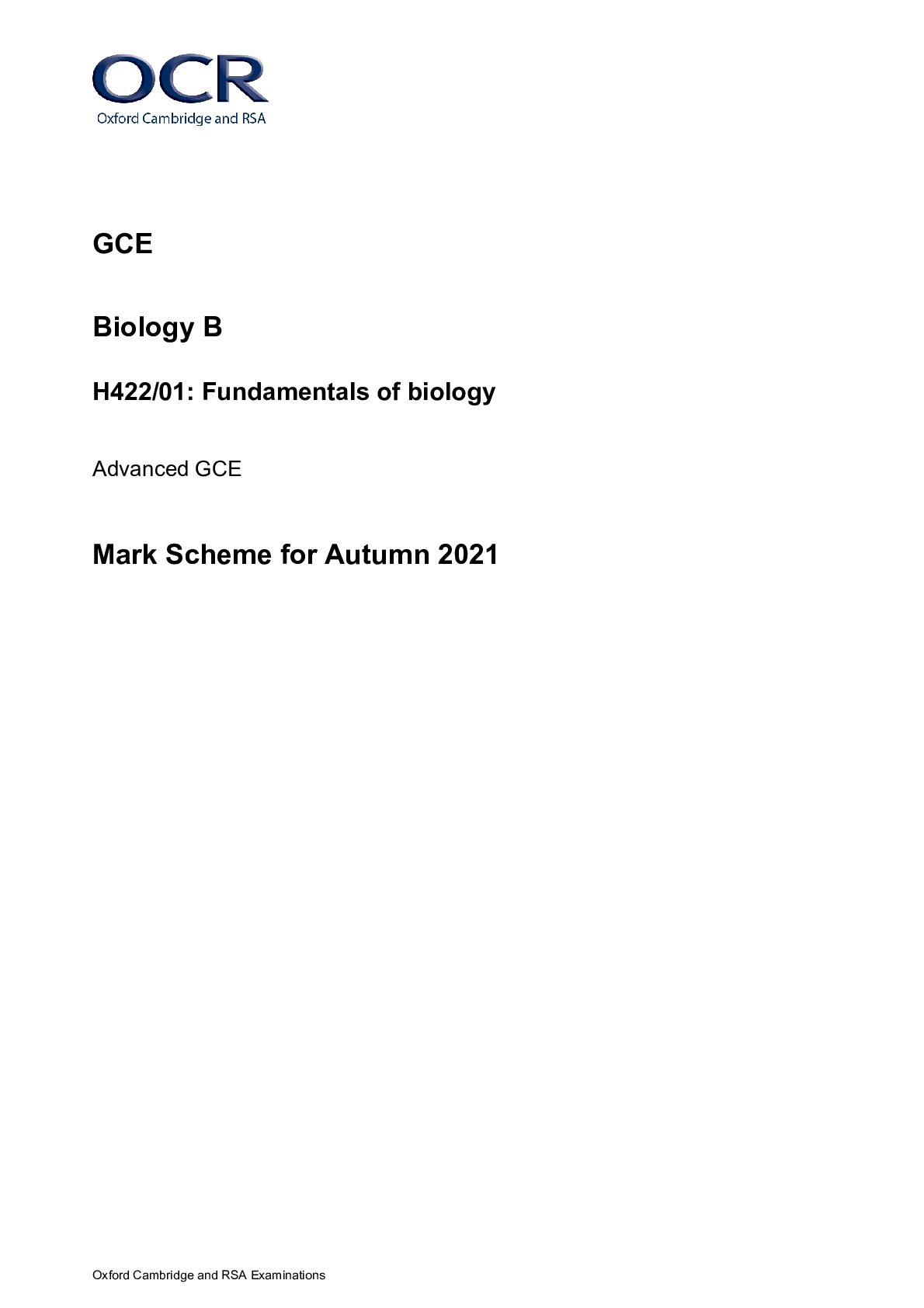
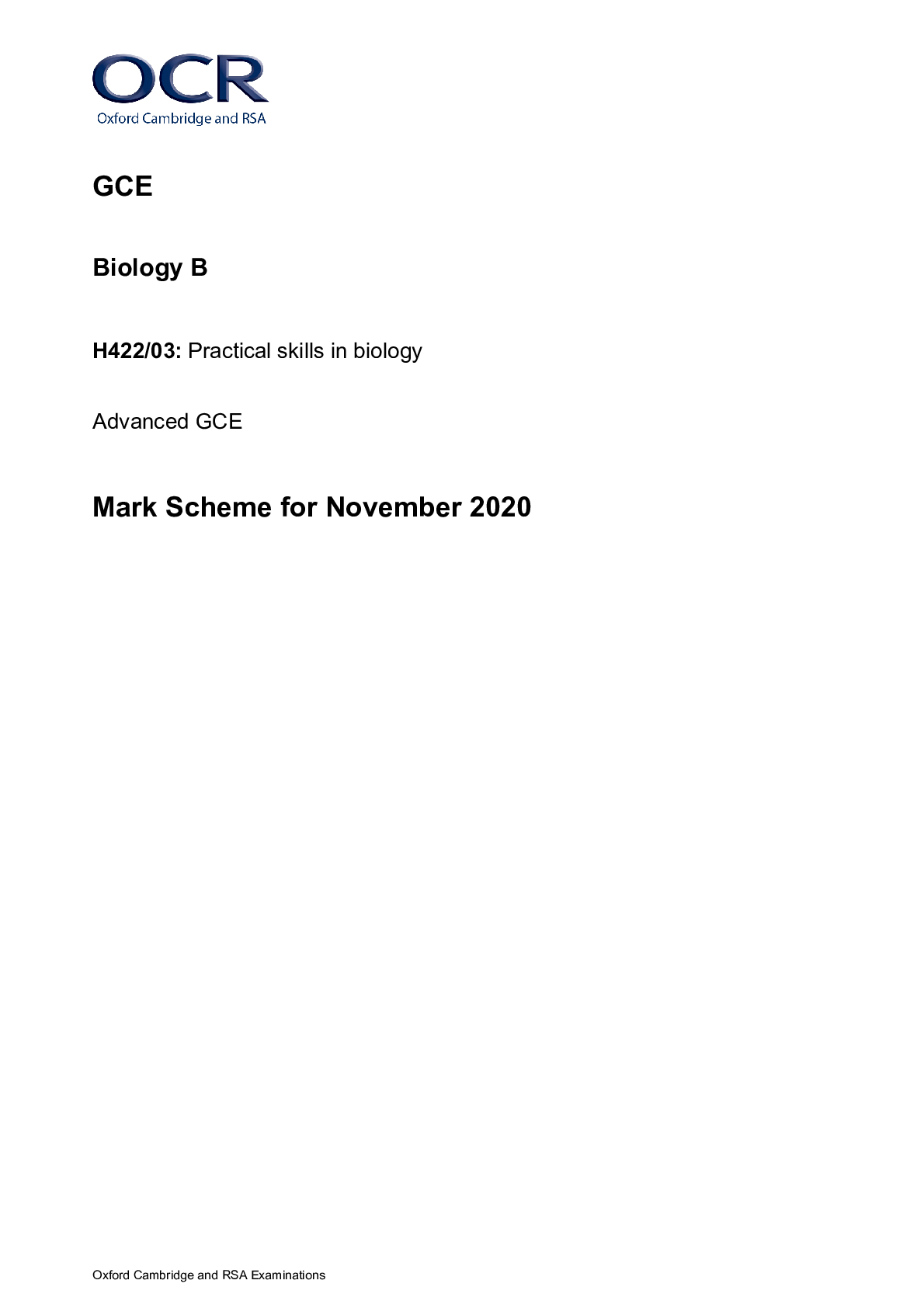
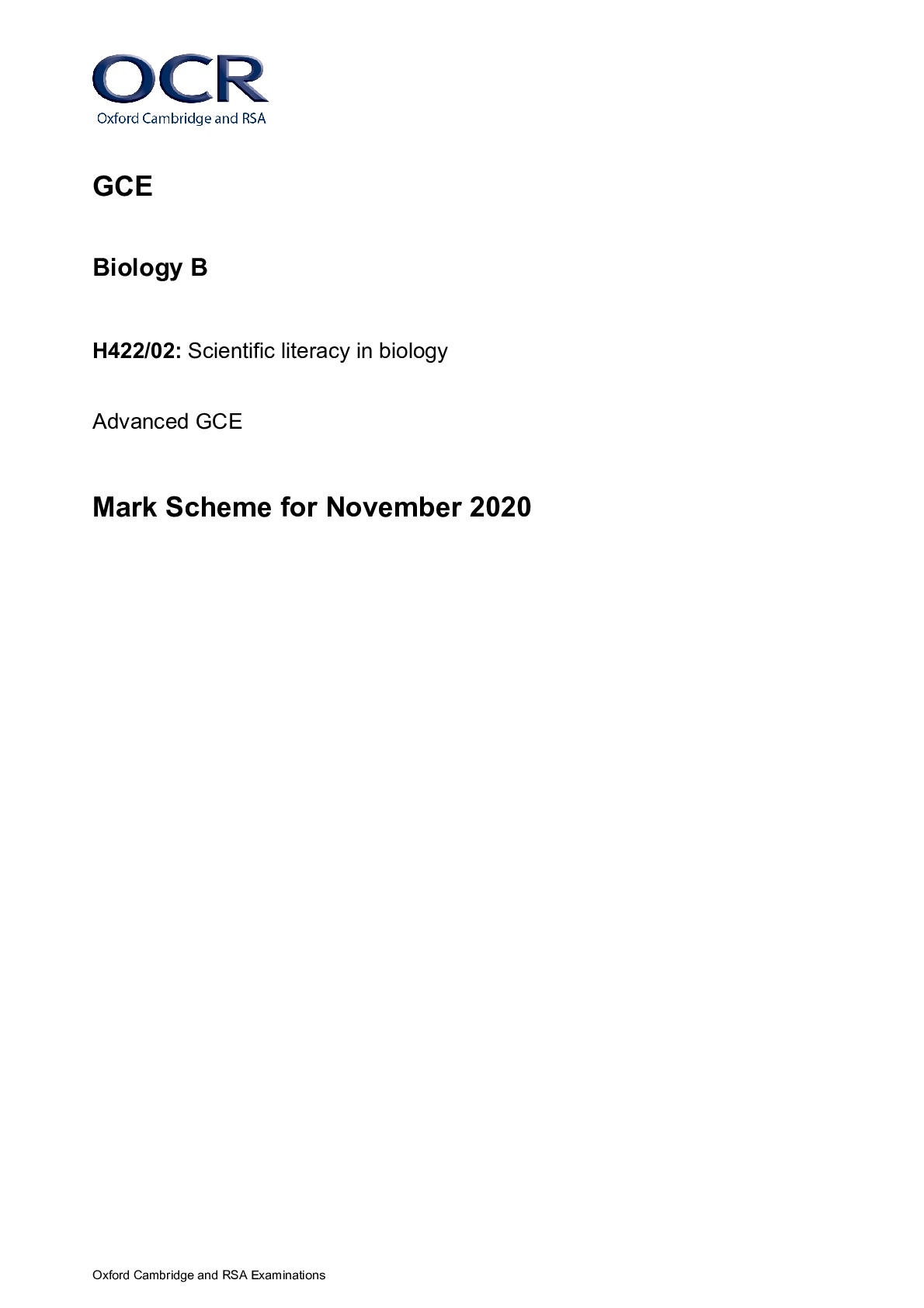
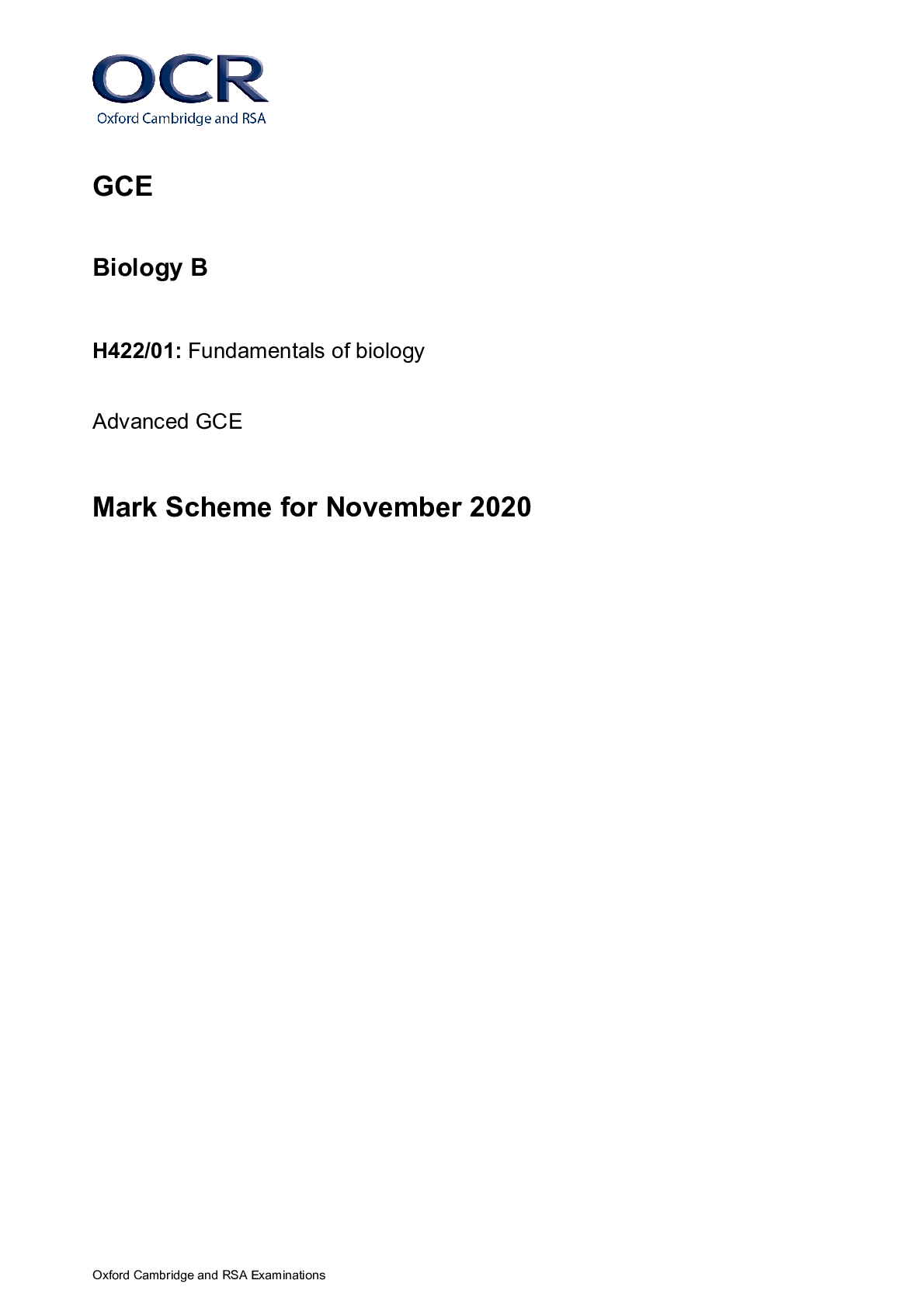

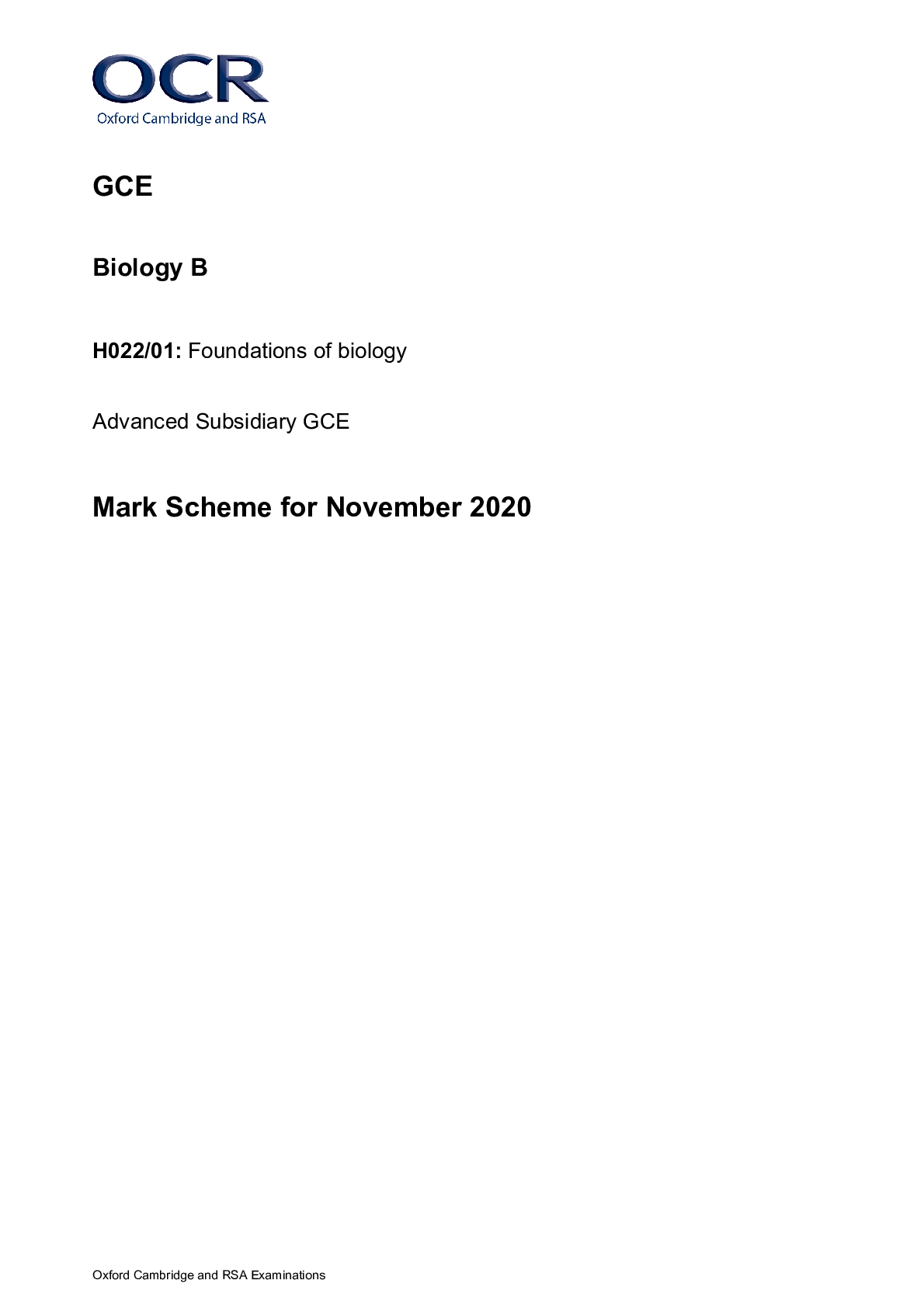
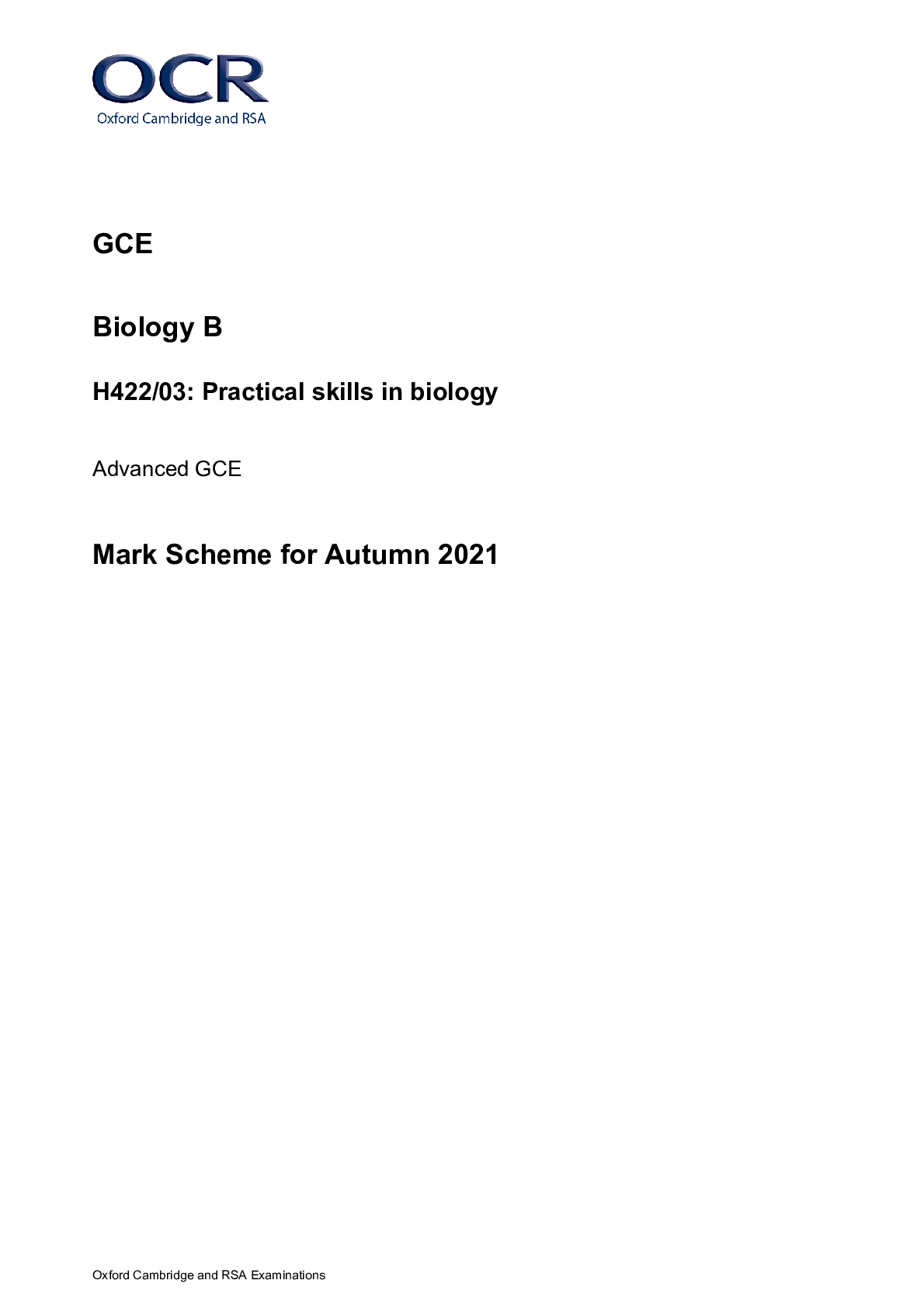
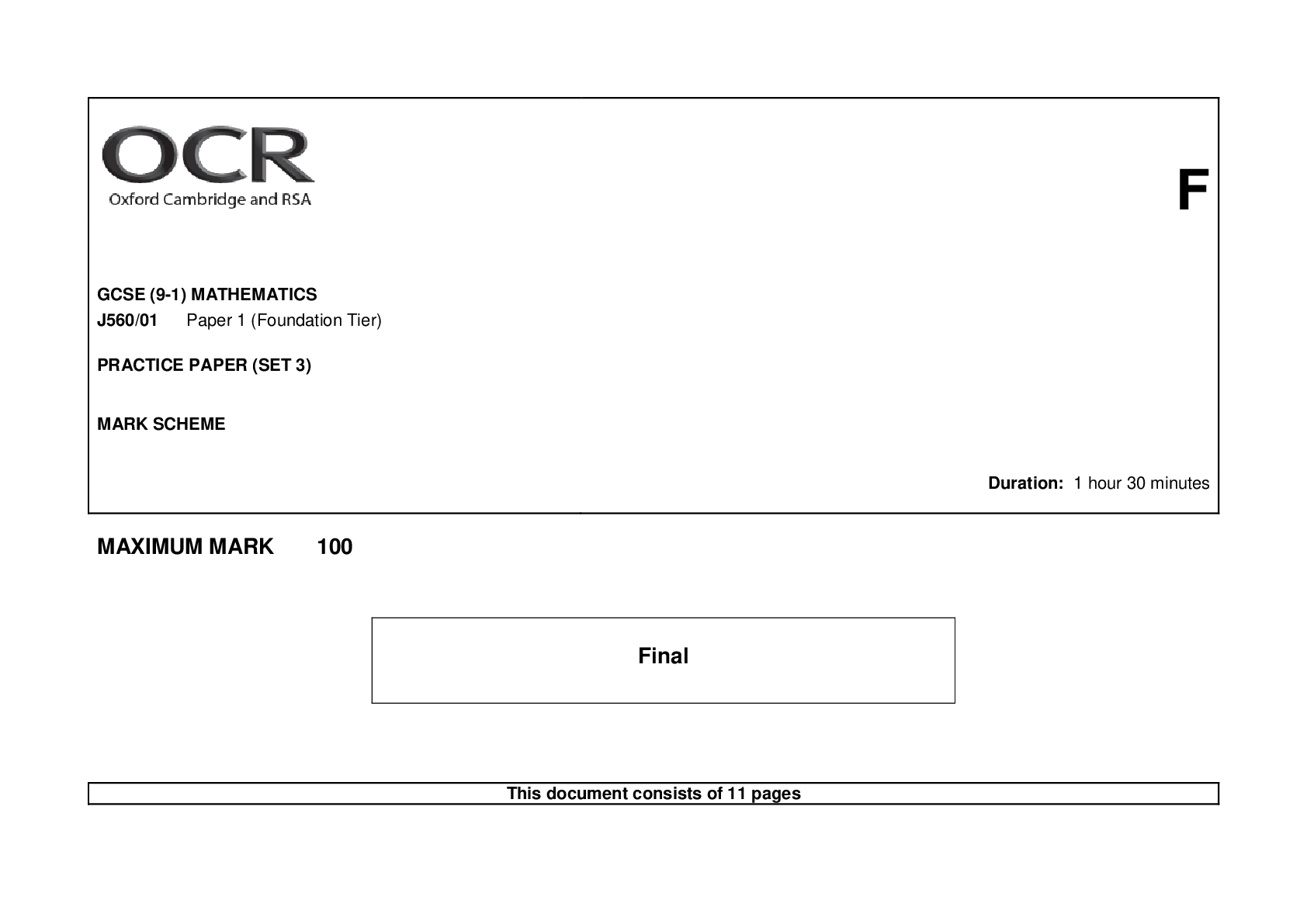
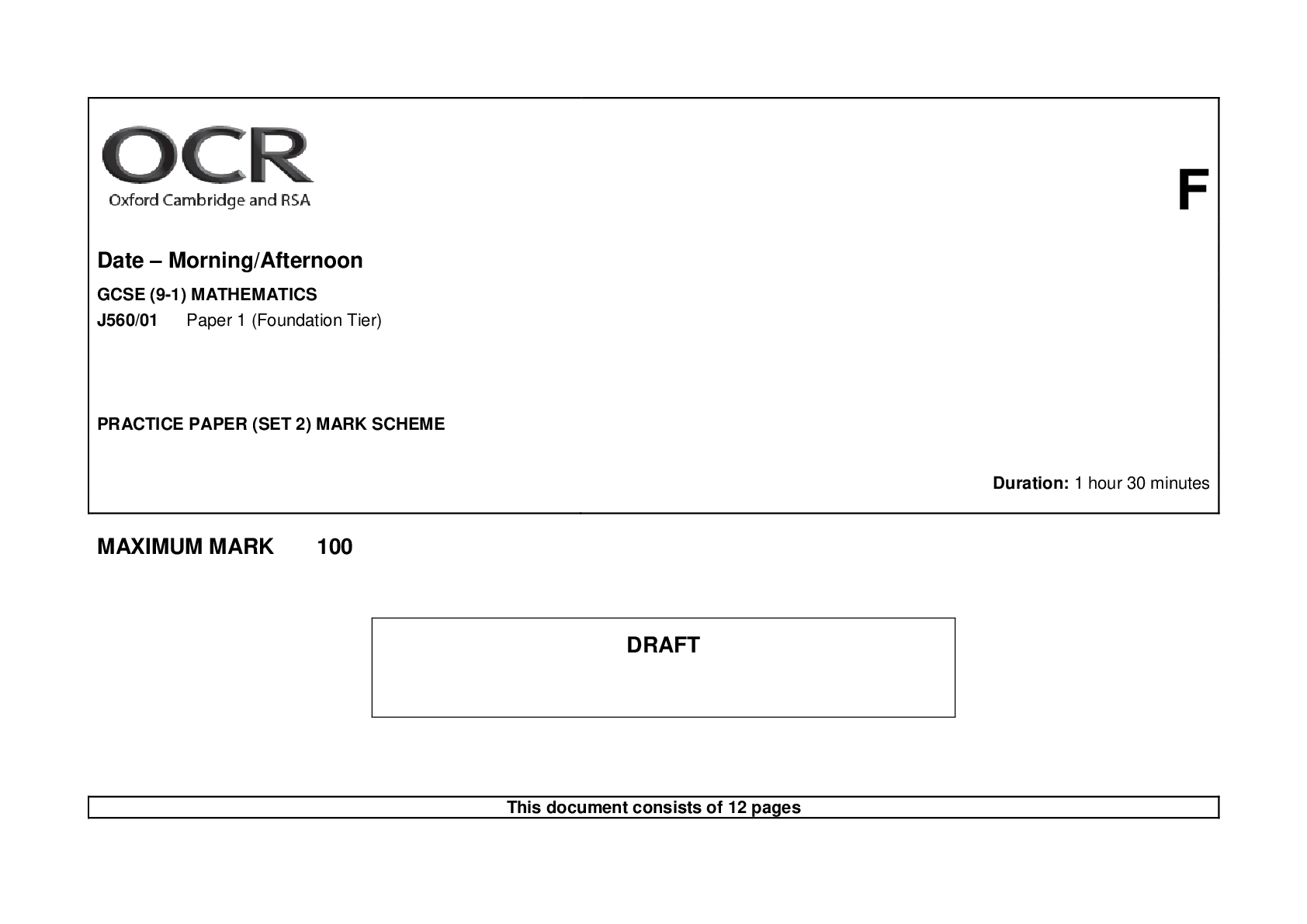
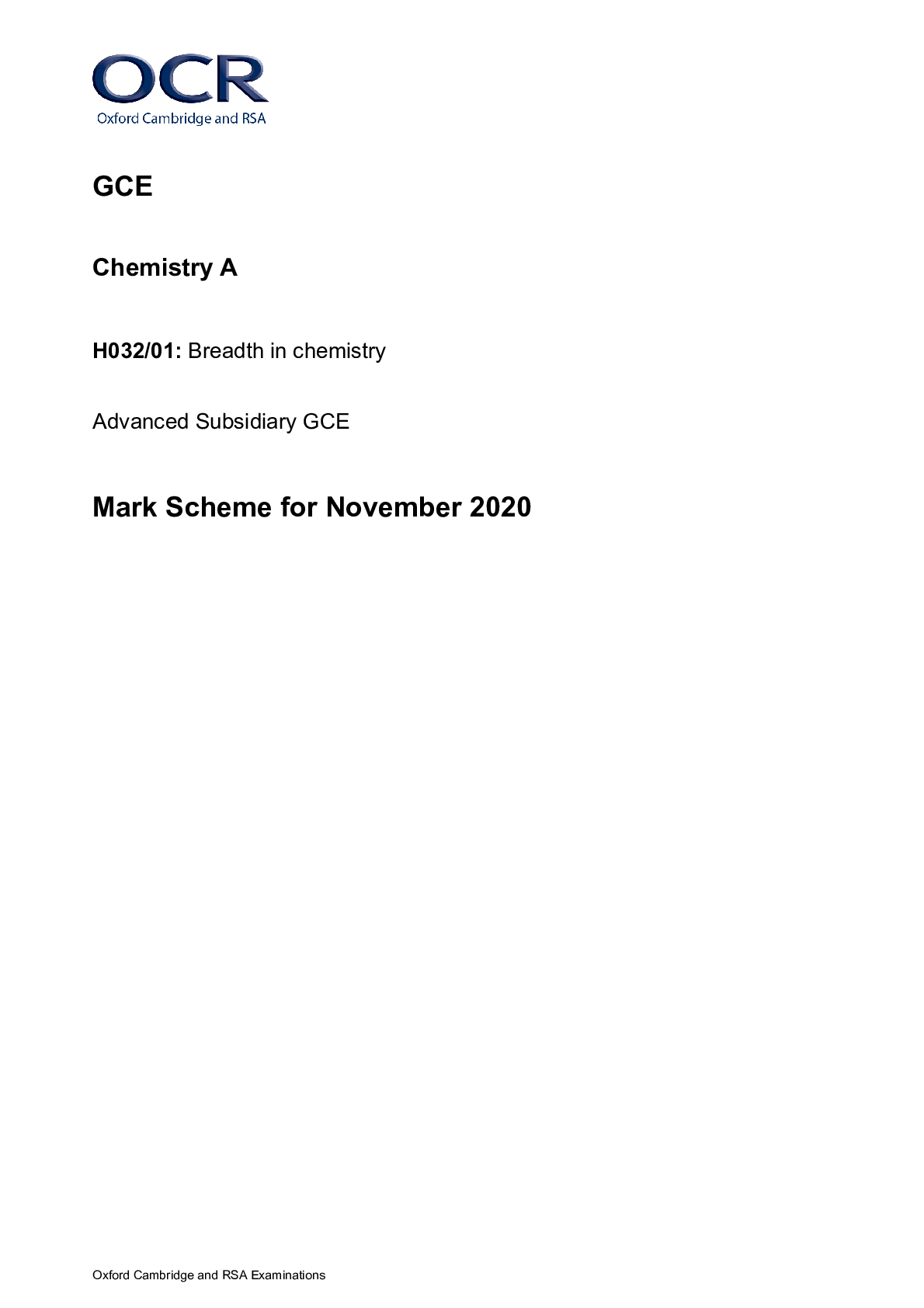

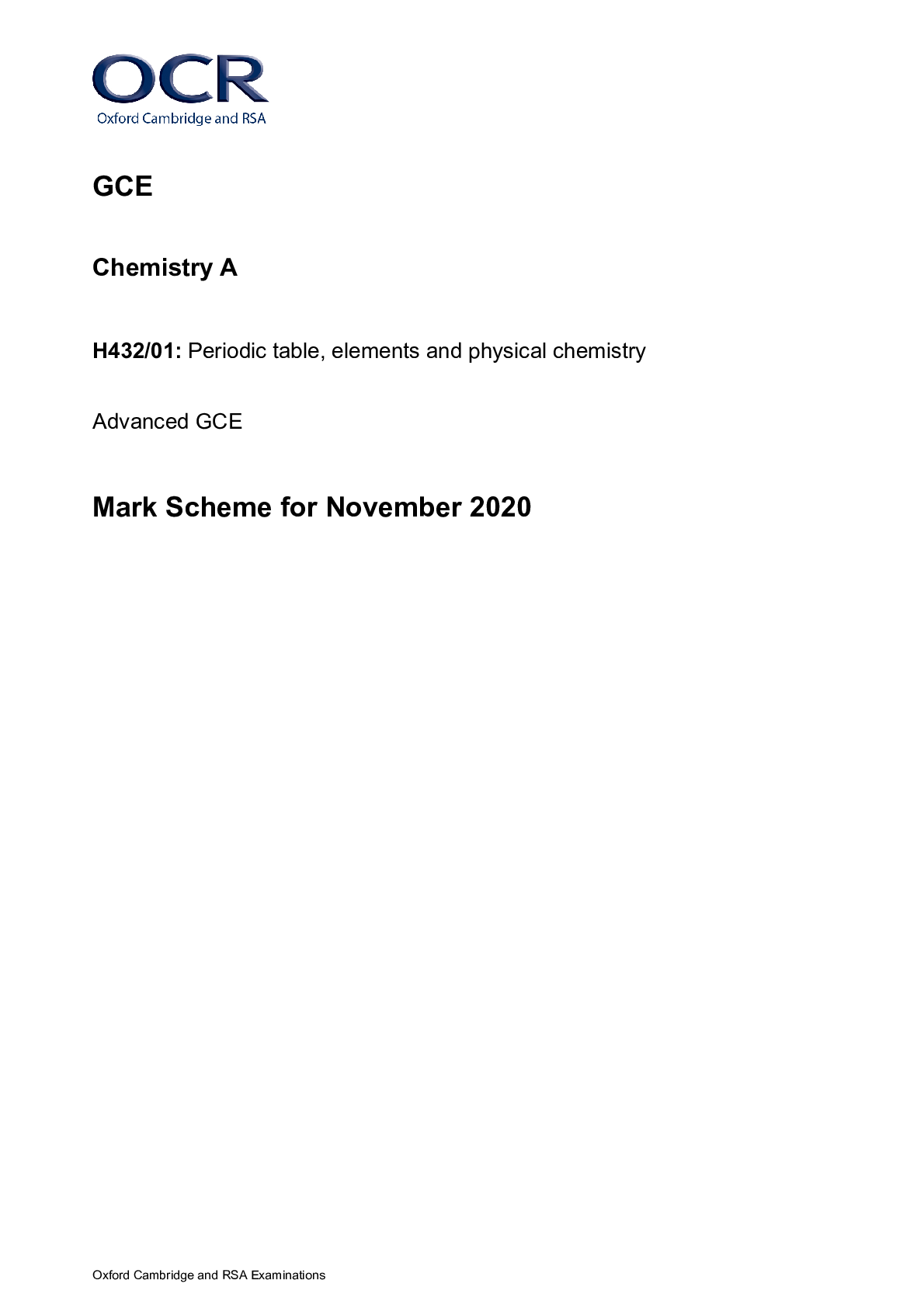
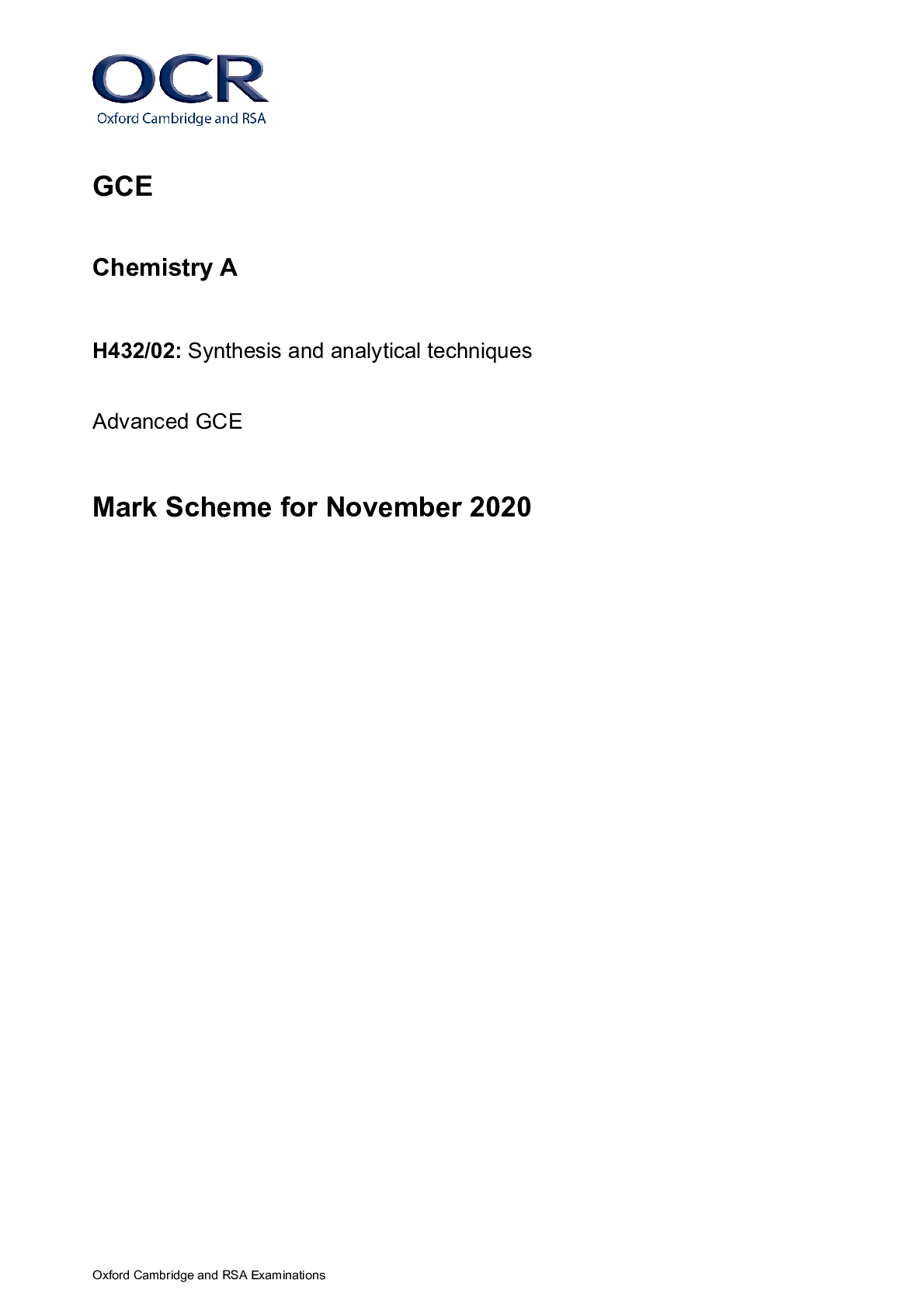

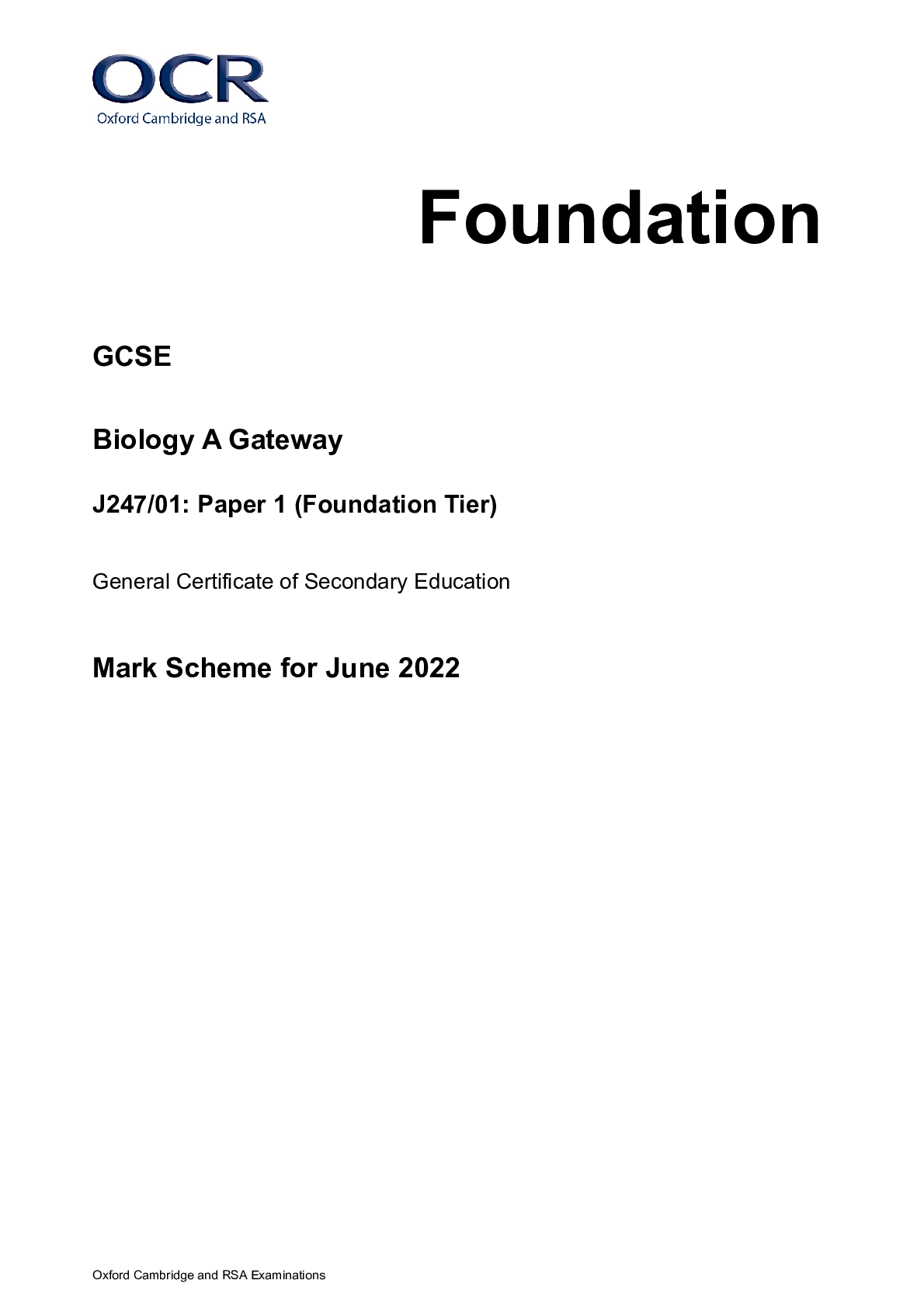
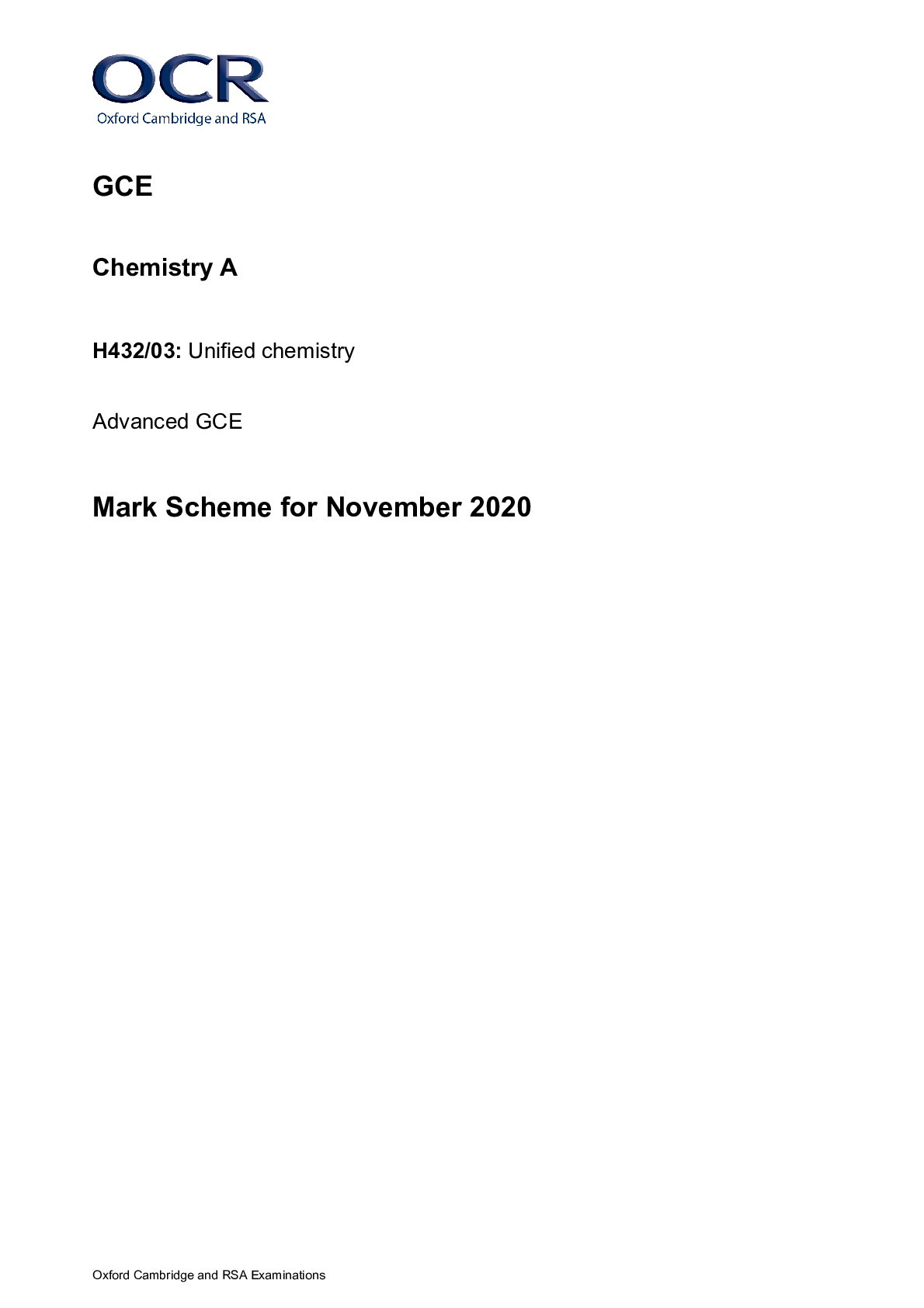
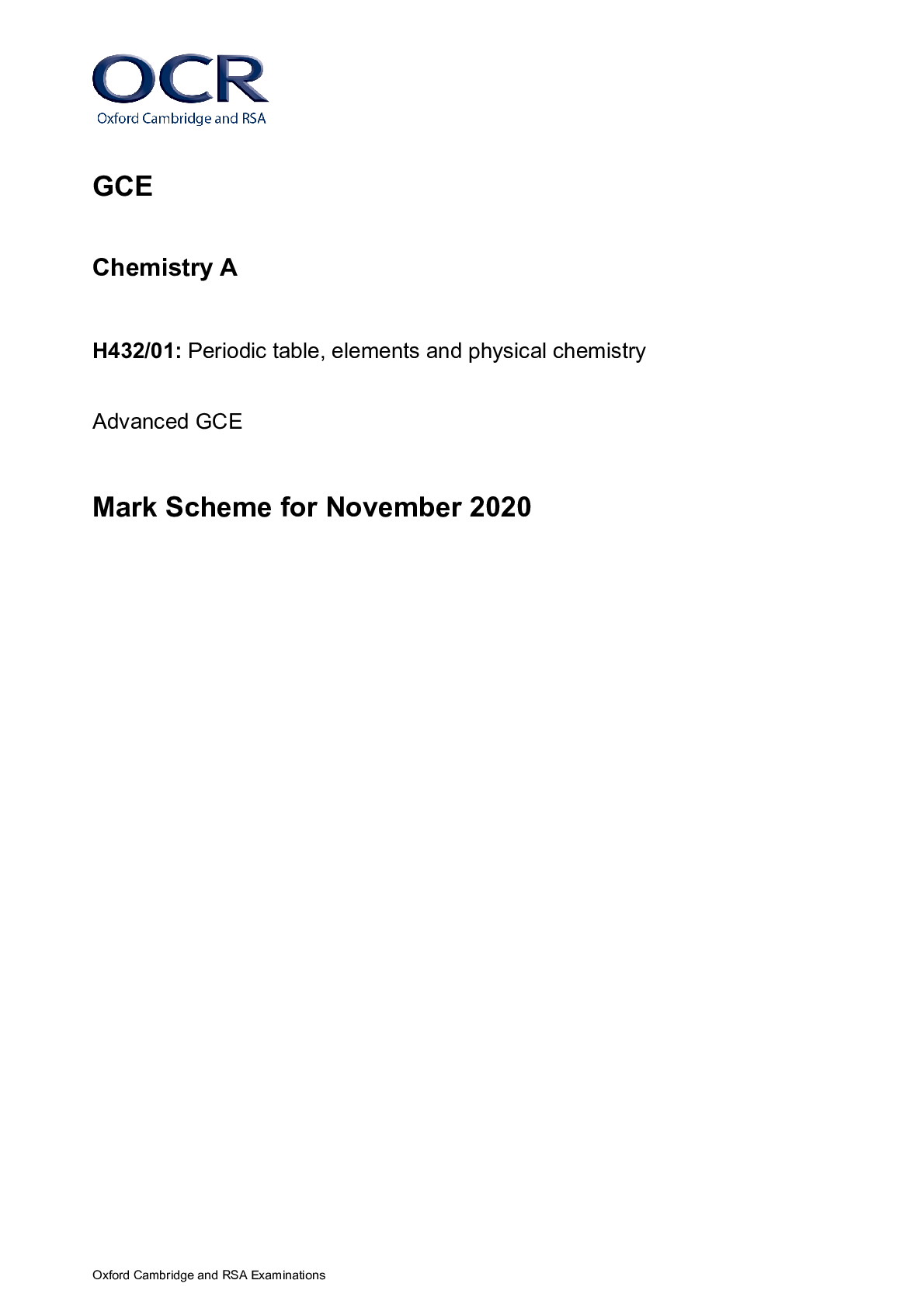
.png)
